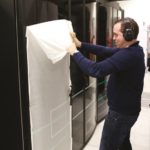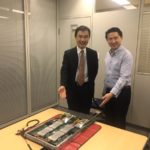Long-time HPC industry veteran and HPE executive Bill Mannel has been named Chief Technologist for Americas HPC & AI Solution Sales at HPE. Mannel joined HPE in 2014, serving as vice president and general manager of high-performance computing and artificial intelligence. Of his new role, Mannel said on his LinkedIn profile, “I’ll be working closely […]
Journal: NCAR Supercomputer ‘Up Against Complex Physics of Programming Thousands of Weather Variables’
The “Cheyenne” supercomputer, an Intel-powered SGI system installed in 2017 at the National Center for Atmospheric Research (NCAR) in Boulder, is at the heart of a major article on climate change appearing in yesterday’s Wall Street Journal. The article, based on extensive interviews with climate scientists at NCAR and other organizations, asserts that HPC simulations […]
HPE Powers New Tesseract Supercomputer at EPCC
Over at EPCC, Professor Peter Boyle describes the new Tesseract supercomputer, which is hosted at EPCC’s Advanced Computing Facility. DiRAC is part of the UK’s e-infrastructure investment to improve computing, software development, data storage, networking and distributed computing networks. “Tesseract is an 844-node HPE SGI 8600 supercomputer. Each node has two Xeon scalable processor 4116 “Silver” nodes, and 96 GB of memory. In total, the new system has 20256 Intel Skylake computing cores, and is interconnected using 100 Gbit/s Intel Omnipath interconnect.”
Radio Free HPC Looks at NREL’s new Eagle Supercomputer
In this podcast, the Radio Free HPC team looks at the new Eagle supercomputing under construction at NREL. “The new machine from HPE will run more detailed models that simulate complex processes, systems, and phenomena to advance early research and development on energy technologies across fields including vehicle, wind power, and data sciences.”
Dr. Eng Lim Goh on HPE’s Spaceborne Supercomputer
In this video from SC17 in Denver, Dr. Eng Lim Goh describes the spaceborne supercomputer that HPE built for NASA. “The research objectives of the Spaceborne Computer include a year-long experiment of operating high performance commercial off-the-shelf (COTS) computer systems on the ISS with its changing radiation climate. During high radiation events, the electrical power consumption and, therefore, the operating speeds of the computer systems are lowered in an attempt to determine if such systems can still operate correctly.”
Gabriel Broner on Why Cloud is the Next Disruption in HPC
“Like the previous disruptions of clusters vs. monolithic systems or Linux vs. proprietary operating systems, cloud changes the status quo, takes us out of our comfort zone, and gives us a sense of lack of control. But the effect of price, the flexibility to dynamically change your system size and choose the best architecture for the job, the availability of applications, the ability to select system cost based on the needs of a particular workload, and the ability to provision and run immediately, will prove very attractive for HPC users.”
Dr. Eng Lim Goh on HPE’s Recent PathForward Award for Exascale Computing
In this video from ISC 2017, Dr. Eng Lim Goh from HPE discusses the company’s recent PathForward award as well as the challenges of designing energy efficient Exascale systems. After that, he gives his unique perspective on HPE’s “The Machine” architecture for memory-driven computing. “The work funded by PathForward will include development of innovative memory architectures, higher-speed interconnects, improved reliability systems, and approaches for increasing computing power without prohibitive increases in energy demand.”
Agenda Posted for HP-CAST at ISC 2017
Hewlett Packard Enterprise has posted their Preliminary Agenda for HP-CAST. As HPE’s user group meeting for high performance computing, the event takes place June 16-17 in Frankfurt, just prior to ISC 2017. “The High Performance Consortium for Advanced Scientific and Technical (HP-CAST) computing users group works to increase the capabilities of Hewlett Packard Enterprise solutions for large-scale, scientific and technical computing. HP-CAST provides guidance to Hewlett Packard Enterprise on the essential development and support issues for such systems. HP-CAST meetings typically include corporate briefings and presentations by HPE executives and technical staff (under NDA), and discussions of customer issues related to high-performance technical computing.”
Pascal GPUs to Accelerate TSUBAME 3.0 Supercomputer at Tokyo Tech
“TSUBAME3.0 is expected to deliver more than two times the performance of its predecessor, TSUBAME2.5,” writes Marc Hamilton from Nvidia. “It will use Pascal-based Tesla P100 GPUs, which are nearly three times as efficient as their predecessors, to reach an expected 12.2 petaflops of double precision performance. That would rank it among the world’s 10 fastest systems according to the latest TOP500 list, released in November. TSUBAME3.0 will excel in AI computation, expected to deliver more than 47 PFLOPS of AI horsepower. When operated concurrently with TSUBAME2.5, it is expected to deliver 64.3 PFLOPS, making it Japan’s highest performing AI supercomputer.”
Five Ways Scale-Up Systems Save Money and Improve TCO
The move away from the traditional single processor/memory design has fostered new programming paradigms that address multiple processors (cores). Existing single core applications need to be modified to use extra processors (and accelerators). Unfortunately there is no single portable and efficient programming solution that addresses both scale-up and scale-out systems.











